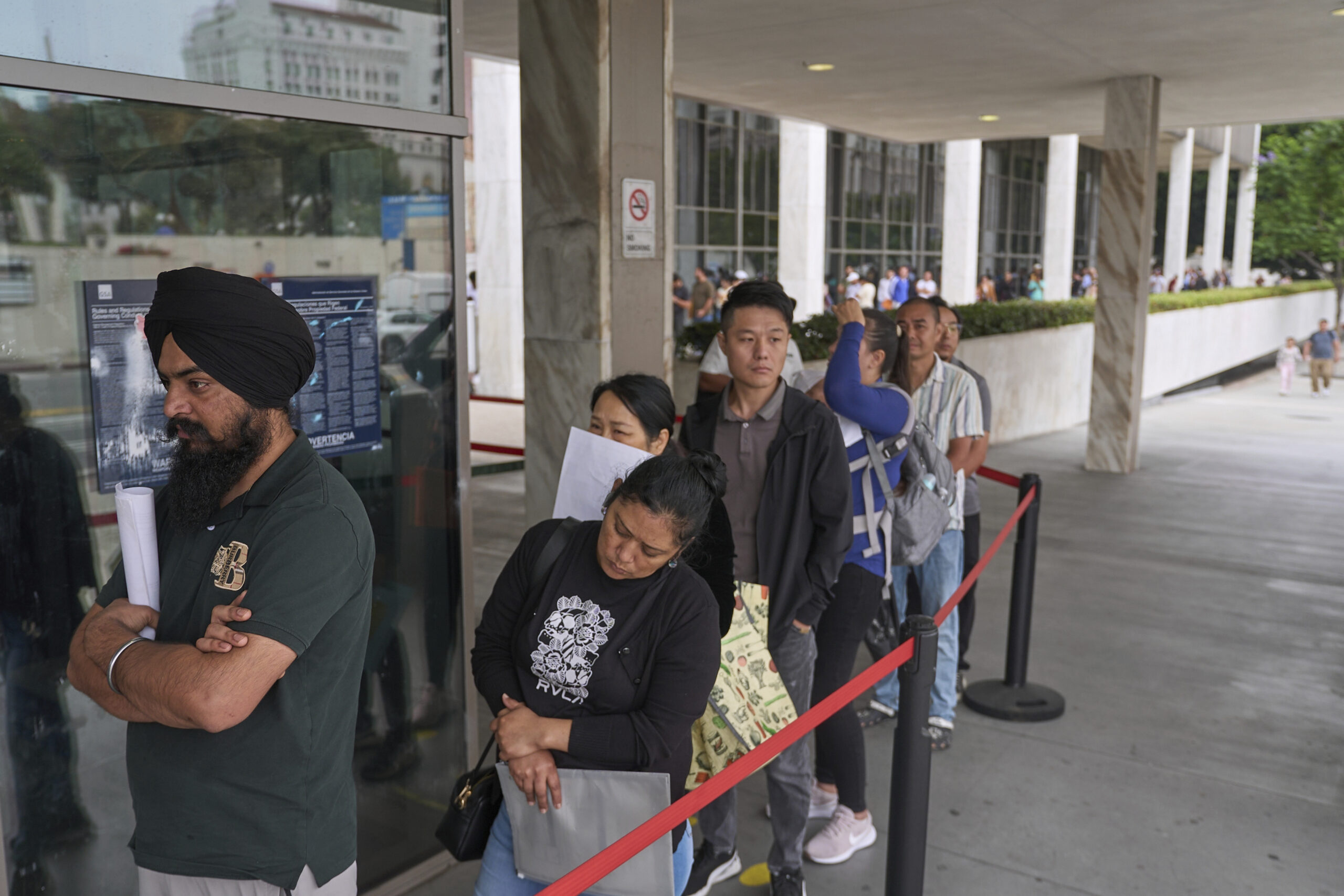At a federal immigration building in downtown Los Angeles guarded by U.S. Marines, daughters, sons, aunts, nieces and others make their way to an underground garage and line up at a door with a buzzer at the end of a dirty, dark stairwell.
It’s here where families, some with lawyers, come to find their loved ones after they’ve been arrested by federal immigration agents.
For immigrants without legal status who are detained in this part of Southern California, their first stop is the Immigration and Customs Enforcement processing center in the basement of the federal building. Officers verify their identity and obtain their biometrics before transferring them to detention facilities. Upstairs, immigrants line up around the block for other services, including for green cards and asylum applications.
On a recent day, dozens of people arrived with medication, clothing and hope of seeing their loved one, if only briefly. After hours of waiting, many were turned away with no news, not even confirmation that their relative was inside. Some relayed reports of horrific conditions inside, including inmates who are so thirsty that they have been drinking from the toilets. ICE did not respond to emailed requests for comment.
Just two weeks ago, protesters marched around the federal complex following aggressive raids in Los Angeles that began June 6 and have not stopped. Scrawled expletives about President Donald Trump still mark the complex’s walls.
Those arrested are from a variety of countries, including Mexico, Guatemala, India, Iran, China and Laos. About a third of the county’s 10 million residents are foreign-born.
Many families learned about the arrests from videos circulating on social media showing masked officers in parking lots at Home Depots, at car washes and in front of taco stands.
Around 8 a.m., when attorney visits begin, a few lawyers buzz the basement door called “B-18” as families wait anxiously outside to hear any inkling of information.
9 a.m.
Christina Jimenez and her cousin arrive to check if her 61-year-old stepfather is inside.
Her family had prepared for the possibility of this happening to the day laborer who would wait to be hired outside a Home Depot in the LA suburb of Hawthorne. They began sharing locations when the raids intensified. They told him that if he were detained, he should stay silent and follow instructions.
Jimenez had urged him to stop working, or at least avoid certain areas as raids increased. But he was stubborn and “always hustled.”
“He could be sick and he’s still trying to make it out to work,” Jimenez said.
After learning of his arrest, she looked him up online on the ICE Detainee Locator but couldn’t find him. She tried calling ICE to no avail.
Two days later, her phone pinged with his location downtown.
“My mom’s in shock,” Jimenez said. “She goes from being very angry to crying, same with my sister.”
Jimenez says his name into the intercom – Mario Alberto Del Cid Solares. After a brief wait, she is told yes, he’s there.
She and her cousin breathe a sigh of relief — but their questions remain.
Her biggest fear is that instead of being sent to his homeland of Guatemala, he will be deported to another country, something the Supreme Court recently ruled was allowed.
9:41 a.m.
By mid-morning, Estrella Rosas and her mother have come looking for her sister, Andrea Velez, a U.S. citizen. A day earlier, they saw Velez being detained after they dropped her off at her marketing job at a shoe company downtown.
“My mom told me to call 911 because someone was kidnapping her,” Rosas said.
Stuck on a one-way street, they had to circle the block. By the time they got back, she says they saw Velez in handcuffs being put into a car without license plates.
Velez’s family believes she was targeted for looking Hispanic and standing near a tamale stand.
Rosas has her sister’s passport and U.S. birth certificate, but learns she is not there. They find her next door in a federal detention center. She was accused of obstructing immigration officers, which the family denies, but is released the next day.
11:40 a.m.
About 20 people are now outside. Some have found cardboard to sit on after waiting hours.
One family comforts a woman who is crying softly in the stairwell.
Then the door opens, and a group of lawyers emerge. Families rush to ask if the attorneys could help them.
Kim Carver, a lawyer with the Trans Latino Coalition, says she planned to see her client, a transgender Honduran woman, but she was transferred to a facility in Texas at 6:30 that morning.
Carver accompanied her less than a week ago for an immigration interview and the asylum officer told her she had a credible case. Then ICE officers walked in and detained her.
“Since then, it’s been just a chase trying to find her,” she says.
12:28 p.m.
As more people arrive, the group begins sharing information. One person explains the all-important “A-number,” the registration number given to every detainee, which is needed before an attorney can help.
They exchange tips like how to add money to an account for phone calls. One woman says $20 lasted three or four calls for her.
Mayra Segura is looking for her uncle after his frozen popsicle cart was abandoned in the middle of the sidewalk in Culver City.
“They couldn’t find him in the system,” she says.
12:52 p.m.
Another lawyer, visibly frustrated, comes out the door. She’s carrying bags of clothes, snacks, Tylenol, and water that she says she wasn’t allowed to give to her client, even though he says he had been given only one water bottle over the past two days.
The line stretches outside the stairwell into the sun. A man leaves and returns with water for everyone.
Nearly an hour after family visitations are supposed to begin, people are finally allowed in.
2:12 p.m.
Still wearing hospital scrubs from work, Jasmin Camacho Picazo comes to see her husband again.
She brought a sweater because he had told her he was cold, and his back injury was aggravated from sleeping on the ground.
“He mentioned this morning (that) people were drinking from the restroom toilet water,” Picazo says.
On her phone, she shows footage of his car left on the side of the road after his arrest. The window was smashed and the keys were still in the ignition.
“I can’t stop crying,” Picazo says.
Her son keeps asking: “Is Papa going to pick me up from school?”
2:21 p.m.
More than five hours after Jimenez and her cousin arrive, they see her stepfather.
“He was sad and he’s scared,” says Jimenez afterwards. “We tried to reassure him as much as possible.”
She wrote down her phone number, which he had not memorized, so he could call her.
2:57 p.m.
More people arrive as others are let in.
Yadira Almadaz comes out crying after seeing her niece’s boyfriend for only five minutes. She says he was in the same clothes he was wearing when he was detained a week ago at an asylum appointment in the city of Tustin. He told her he’d only been given cookies and chips to eat each day.
“It breaks my heart seeing a young man cry because he’s hungry and thirsty,” she says.
3:56 p.m.
Four minutes before visitation time is supposed to end, an ICE officer opens the door and announces it’s over.
One woman snaps at him in frustration. The officer tells her he would get in trouble if he helped her past 4 p.m.
More than 20 people are still waiting in line. Some trickle out. Others linger, staring at the door in disbelief.







